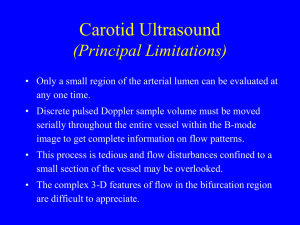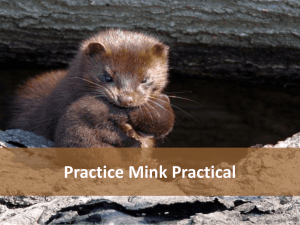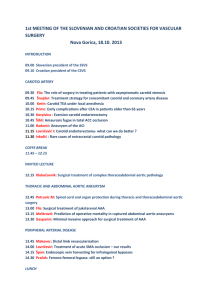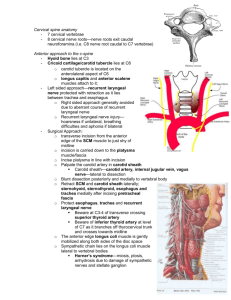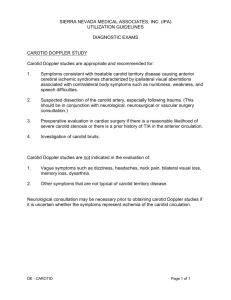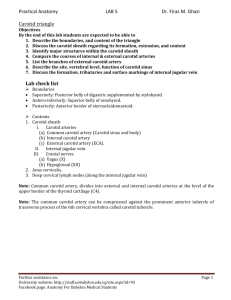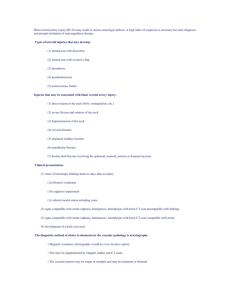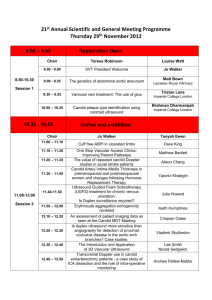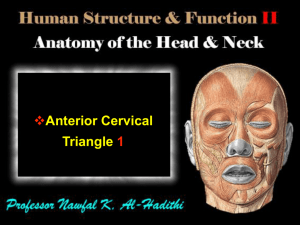Carotid triangle - Post-it
advertisement
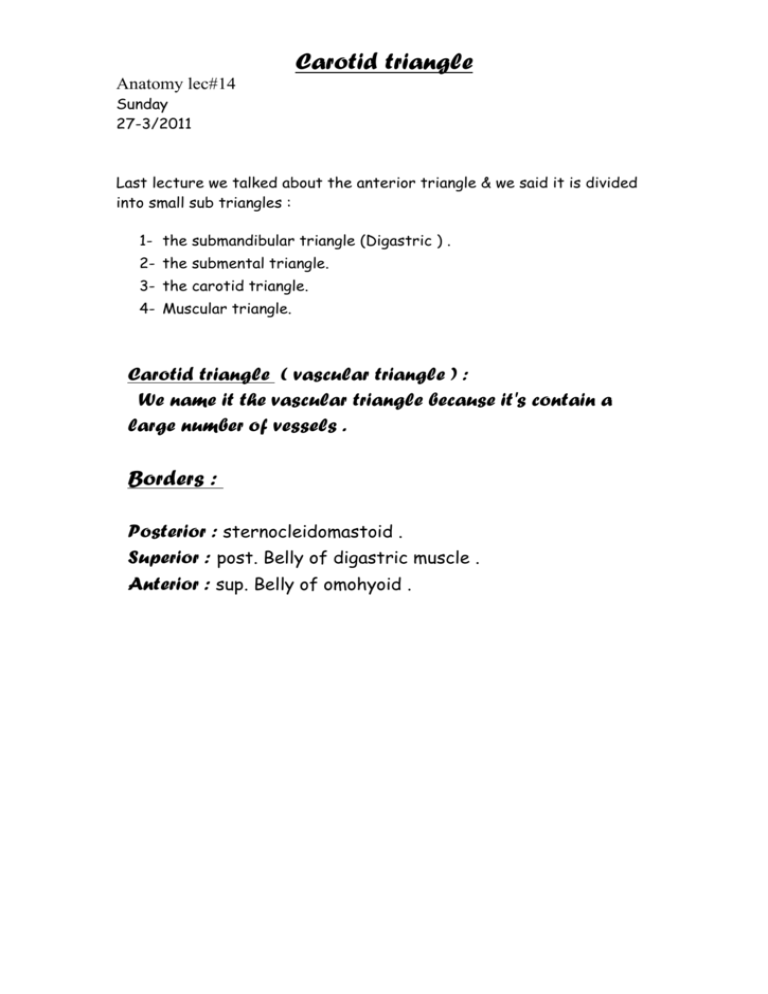
Carotid triangle Anatomy lec#14 Sunday 27-3/2011 Last lecture we talked about the anterior triangle & we said it is divided into small sub triangles : 1- the submandibular triangle (Digastric ) . 2- the submental triangle. 3- the carotid triangle. 4- Muscular triangle. Carotid triangle ( vascular triangle ) : We name it the vascular triangle because it's contain a large number of vessels . Borders : Posterior : sternocleidomastoid . Superior : post. Belly of digastric muscle . Anterior : sup. Belly of omohyoid . Contents of carotid triangle : 1- Carotid sheath . 2- Common carotid artery . 3- External carotid artery . 4- Internal carotid artery. 5- Internal jugular vein. 6- Vagus nerve . 7- Hypoglossal nerve. 8- Sympathetic trunk. 9- Ansa cervicalis . ( ansak da klam ) 10- Cervical lymph nodes. Now we're going to talk about each content : Carotid sheath : a- tubular extension of deep cervical fascia . b- extending from the base of the skull to the root of the neck at arch of aorta .( c- contents : common carotid artery ( below). external carotid artery (above) . internal carotid artery ( above). internal jugular v. ( most ) . vagus nerve ( all way ) . d- Sympathetic trunk lies behind the sheath . (stick to the post. Part of the carotid sheath) Common carotid artery : Either right or left CCA : Start behind sternocalavicular joint . Ascend within carotid. End sup. Border of thyroid cartilage by dividing into : 1 ICA( interior) 2-ECA(exterior) External carotid artery : (8 branches) 1- Supplies structures outside the skull. 2- Pass deep to post belly of digastric (bridge) ; 5 below , 3 above 5 below: (Navy) 1- Superior thyroid (to the thyroid ) . 2- Ascending pharyngeal (to the pharynx). 3- Lingual (to the tongue). 4- Facial. (to the face). 5- Occipital.( occipital bone). 3 above : (air force) 1- Post. Auricular artery. 2- Superficial temporal. 3- Maxillary. 3-Start at the upper border of thyroid cartilage. 4- Ascend within the carotid sheath . 5- End within parotid (behind neck of the mandible) by dividing into ; 1- Superficial temporal A. 2- Maxillary artery. Internal carotid artery : Start upper part of thyroid cartilage . Ascend inside carotid sheath . Passing within the carotid triangle End at the base of the skull , where ?? by entering the carotid canal which continue as foramen lacerum. Has 4 parts : 1- cervical. 2- petrous . 3- cavernous.( inside the cavernous sinus , S shape) 4- cerebral ,gives : a- ant. Cerebral artery. b- middle cerebral A. every artery Has a vein with the same name but reverse direction & at the end all of these veins will drain into IJV . Internal jugular Vein : direct continuation of sigmoid sinus Begins: in jugular foramen as a continuation of sigmoid sinus . Descend: within carotid sheath . End: at root of the neck by uniting with subclavian vein to form The Brachiocephalic vein.(in the right & left ). Has : Bicuspid valve at its end (inferior bulb) But In general ijv is valvless . Drains : brain, face, neck. Hypoglossal nerve : Descend : Deep to digastric post. To enter carotid triangle . Ascend : Deep to digastric post. To enter digastric triangle Pass between mylohyoid and hyoglossus muscles . Exit : via hypoglossal canal . Motor to all tounge muscles except on ( palato glossus ) Carry C1 nerve . (geniohyoid) Anas cervicalis : (ansa=loop) Loop of nerves from C1-C3 to supply muscles in the ant. Triangle.has 2 roots : 1- Sup. C1 nerve join CN xii after leaving the skull. 2- inf. From c2,c3 nerves of cervical plexus completing the loop that form ant. To Internal jugular vein. Vagus nerve: The 10th cranial nerve. Leave The skull via jugular foramen. Pass throughout the carotid sheath between , Internal carotid + (CCA & Internal jugular vein). All through the carotid sheath. Rt recurrent laryngeal n. loop below right subclaviar.(muscle of the larynx). Lt recurrent laryngeal n. loop below aortic arch. (between esophagus &trachea ) Cranial root of CN xi join vagus below inferior ganglia ..distributed in pharyngeal & recurrent laryngeal branches. Done by : Raghad al-farajat :D
